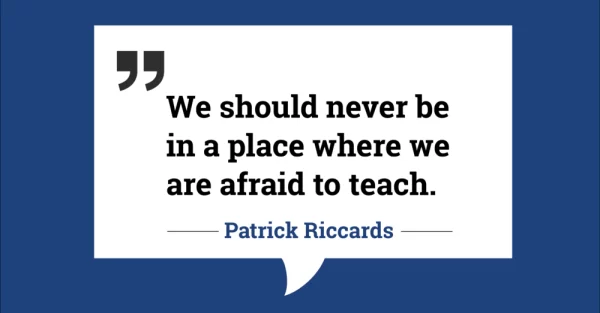Education Talk Radio host Larry Jacobs and Driving Force Institute Founder and CEO Patrick Riccards had an eye-opening conversation about the challenges that so many history teachers are facing in classrooms across the country. Riccards also shared some insight about what his company is doing to help solve those problems. Here are at some of the things they discussed.
In recent years, we’ve seen some states making efforts to prevent the teaching of critical race theory in public K-12 schools, even though critical race theory isn’t being taught in those schools. This misconception, they agreed, illustrates how critical it is for the public to have open and honest dialogue, based on accurate and actionable information, when education-related issues come up.
Teaching these topics is incredibly challenging, and with a Presidential election year underway, many history teachers are struggling to navigate all the division while making sure that every student has rich opportunities and equitable access to balanced, civil, enlightening classroom discussions about the content they’re learning.
“I think we should never be in a place where we are afraid to teach,” said Riccards.
Teaching the Untold Moments
Students in American classrooms have long been missing out on countless tidbits of information about people, places, artifacts and events that have shaped civilization. Riccards calls these the “untold moments of history.” The Driving Force Institute created the Essentials Project to bring those moments to life.
“We are one of the largest producers of American history films in the world,” he said, “and we produce more than 500 titles, working with partners. You know, people don’t necessarily know about us; they know about our partners. We work with the Smithsonian, we work with American battlefield trust, we work with New York Historical Society, we work with iCivics. We now work with the International Spy Museum.”
Leveraging Technology for Learning
“The question is not how do you teach through technology? The question is, how do you use technology as an effective tool in your toolbox?”
As technology continues to rapidly change, so must everyone else, from students to educators to edtech providers and beyond. More than ever, teachers are using phones and video to engage students and make learning more interesting and relevant. Riccards thinks that’s a step in the right direction.
“This is a generation that is spending… even as 12, 14, 16-year-olds, they spend more than two hours a day watching videos off their phones, you know, watching YouTube videos, watching TikToks… so why wouldn’t you teach them in a way that they feel comfortable? Why are you going to force them to use a textbook that you and I probably had?”
“We’ve created professional development for teachers,” he added, “not on how to teach history — teachers know how to teach history. They know what they should be teaching, but how do you use these technologies in an effective way in the classroom?”
In higher ed, Schools of Education are also scrambling to adapt and find alignment with today’s teaching practices, particularly in regards to the increased use of technology in the classroom. But in many colleges and universities, that is not going so well.
“They’re not using best practices. They’re not using what we know is necessary. They’re using what feels good, or they’re using what professors learned themselves when they were undergraduates,” said Riccards.
Teaching Critical Thinking
Riccards emphasized that history can be a valuable tool for fostering critical thinking skills because it forces students out of their comfort zones and enables them to explore other perspectives and address complex issues through a more informed lens. But how can teachers make the instructional shifts needed to facilitate this sort of environment? That’s another big challenge.
“We still believe that, you know, those teachers who are truly passionate, who are truly effective, are the ones who have to jump on top of desks or show up in powdered wigs to teach the Constitution,” explained Riccards. “Is the focus on the teacher, or is the focus on the learner?” he asked, adding that the Driving Force Institute’s goal is to create films that focus on the learner, but also empower educators with thought-provoking content that encourages productive learning that leads to true intellectual growth in every student.

History and civics education go hand in hand, says Riccards. Just as a good doctor needs to understand both medicine and biology, an informed citizen with a strong civic voice needs to know history. And if we want to have a thriving society in the future — if we want today’s learners to become engaged citizens who can contribute meaningfully to society —it’s imperative that we get this right.



